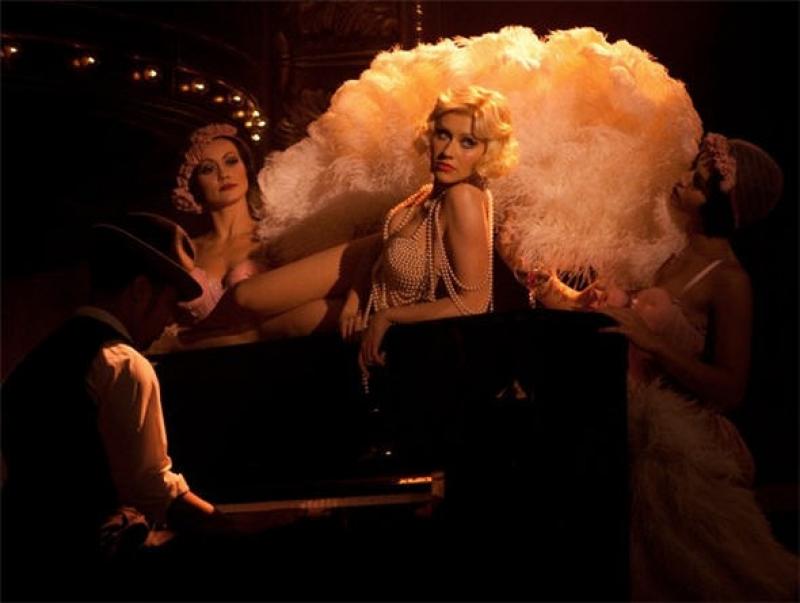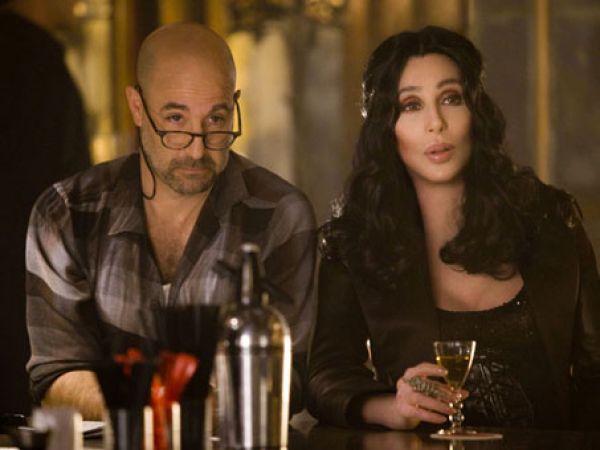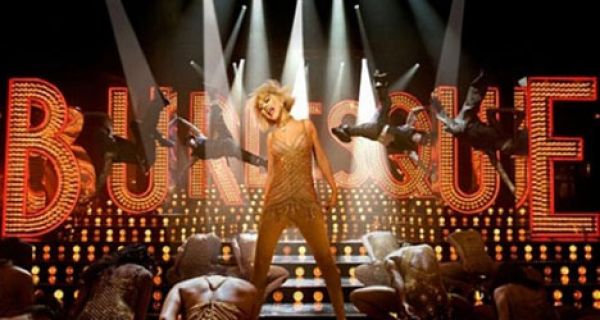Burlesque | reviews, news & interviews
Burlesque
Burlesque
Hollywood castrates the art of Burlesque in this glossy new film

“Show a little more, show a little less. Add a little smoke – welcome to burlesque.” The coy, wittier sister of stripping, and first cousin to musical theatre, the 19th-century art of burlesque is currently enjoying a revival. With comely champions in Dita von Teese and our own gloriously named Immodesty Blaize, the art has shaken off its cruder associations and shimmied into the diamante-studded mainstream.
Written and directed by Steven Antin, whose CV includes “several music videos”, a Pussycat Dolls-themed reality television competition and a now rather distant acting career, the plot plays out exactly as you’d expect. Iowa-born Ali (Christina Aguilera) waits tables (and occasionally dances on them) in a dingy diner, dreaming of her escape to LA. During an energetically soundtracked credit sequence we get her on a bus and all the way to the big city, depositing her conveniently in front of a run-down burlesque club – a windowless world of retro-fantasy with “the best view on the Sunset Strip”. It is here that she must do battle with feather boas and bitchery, making her way from wide-eyed country waitress to star.
If this all sounds a bit 1980s that’s because it is, even down to the presence of Cher as Tess (pictured below with Stanley Tucci as Sean), the club’s “no business during business hours” manager. Given dialogue constructed from MDF, one rather effortful power ballad and a selection of alarming outfits, she makes a fair stab at bringing some warmth to proceedings, defying all advice from her plastic surgeon and recalling the glory days of Mermaids and Moonstruck. Stanley Tucci as Sean, the club’s gay wardrobe mistress, is a gift of a comedy partner, and if the role doesn’t exactly stretch his patented routine, he and Cher do enjoy some of the film’s more acerbic exchanges. (Acerbic here must be understood in the context of dialogue capable of earnestly proclaiming: “Life is about the choices you make.”)
 Teenybopper-appropriate man candy comes in the form of Grey’s Anatomy’s McSteamy (Eric Dane) as Marcus (“not the bad guy, the wrong guy”), a property developer with designs on more than just the club, and Cam Gigandet as Ali’s flatmate and inevitable lover Jack. When the latter’s penchant for eye make-up is seriously held up as the major barrier to their romance you know the writers were struggling. Sporting little or no clothing covering either torso or muscled arms, one only hopes Gigandet was comfortable with being exploited in so banal a manner.
Teenybopper-appropriate man candy comes in the form of Grey’s Anatomy’s McSteamy (Eric Dane) as Marcus (“not the bad guy, the wrong guy”), a property developer with designs on more than just the club, and Cam Gigandet as Ali’s flatmate and inevitable lover Jack. When the latter’s penchant for eye make-up is seriously held up as the major barrier to their romance you know the writers were struggling. Sporting little or no clothing covering either torso or muscled arms, one only hopes Gigandet was comfortable with being exploited in so banal a manner.
With plot and supporting roles merely scaffolding for a series of expensive production numbers, Aguilera comes off rather well. No one can deny the power of her “mutant lungs” or the beautifully shaded vocals she brings to songs such as “A Guy What Takes his Times” and “Something’s Got a Hold on Me”. Driving the score from big-band classics to newly penned numbers (Cher’s tango-inspired “Welcome to Burlesque” is a stand-out), she pouts and poses as appropriate in what amounts to the genetically modified offspring of her 2001 “Lady Marmalade” music video.
 The trouble is that despite a nice line in satin corsetry and maribou-trimmed peignoirs, it’s all just a bit too clean-cut. Like the implausibly tidy trailer park Ali leaves behind in Iowa, the film jettisons the seduction along with the sex, leaving it pasteurised and oddly unreal. Burlesque, for all its subversive wit, is ultimately about excess, about the hyper-real extremes of fantasy and artifice, not the sordid Showgirls grindings nor the milk-fed wholesomeness that Hollywood seems capable of conceiving. While Moulin Rouge at least embraced the feather-trimmed ironies and dark corners of the business, Burlesque at once seeks to deny them and hold them up as a cautionary tale (a sub-plot involving a dancer’s alcohol addiction feels like a graceless bow to Middle America).
The trouble is that despite a nice line in satin corsetry and maribou-trimmed peignoirs, it’s all just a bit too clean-cut. Like the implausibly tidy trailer park Ali leaves behind in Iowa, the film jettisons the seduction along with the sex, leaving it pasteurised and oddly unreal. Burlesque, for all its subversive wit, is ultimately about excess, about the hyper-real extremes of fantasy and artifice, not the sordid Showgirls grindings nor the milk-fed wholesomeness that Hollywood seems capable of conceiving. While Moulin Rouge at least embraced the feather-trimmed ironies and dark corners of the business, Burlesque at once seeks to deny them and hold them up as a cautionary tale (a sub-plot involving a dancer’s alcohol addiction feels like a graceless bow to Middle America).
That the term “burlesque” derives originally from the satirical parodies of the likes of Chaucer and Thackeray seems a detail the team behind Burlesque could do well to take on board. Wit and whimsy are strikingly lacking from this stubbornly mainstream product, which needs a lesson from Miss Von Teese in the difference between concealment and absence, titillation and pornography, suggestion and sex.
Explore topics
Share this article
The future of Arts Journalism
You can stop theartsdesk.com closing!
We urgently need financing to survive. Our fundraising drive has thus far raised £49,000 but we need to reach £100,000 or we will be forced to close. Please contribute here: https://gofund.me/c3f6033d
And if you can forward this information to anyone who might assist, we’d be grateful.

Subscribe to theartsdesk.com
Thank you for continuing to read our work on theartsdesk.com. For unlimited access to every article in its entirety, including our archive of more than 15,000 pieces, we're asking for £5 per month or £40 per year. We feel it's a very good deal, and hope you do too.
To take a subscription now simply click here.
And if you're looking for that extra gift for a friend or family member, why not treat them to a theartsdesk.com gift subscription?
more Film
 Weapons review - suffer the children
'Barbarian' follow-up hiply riffs on ancient fears
Weapons review - suffer the children
'Barbarian' follow-up hiply riffs on ancient fears
 theartsdesk Q&A: filmmaker Dag Johan Haugerud on sex, love, and confusion in the modern world
The writer-director discusses first-love agony and ecstasy in 'Dreams', the opening UK installment of his 'Oslo Stories' trilogy
theartsdesk Q&A: filmmaker Dag Johan Haugerud on sex, love, and confusion in the modern world
The writer-director discusses first-love agony and ecstasy in 'Dreams', the opening UK installment of his 'Oslo Stories' trilogy
 Oslo Stories Trilogy: Dreams review - love lessons
First love's bliss begins a utopian city symphony
Oslo Stories Trilogy: Dreams review - love lessons
First love's bliss begins a utopian city symphony
 Blu-ray: Two Way Stretch / Heavens Above!
'Peak Sellers': two gems from a great comic actor in his prime
Blu-ray: Two Way Stretch / Heavens Above!
'Peak Sellers': two gems from a great comic actor in his prime
 Late Shift review - life and death in an understaffed Swiss hospital
Petra Volpe directs Leonie Benesch in a compelling medical drama
Late Shift review - life and death in an understaffed Swiss hospital
Petra Volpe directs Leonie Benesch in a compelling medical drama
 The Naked Gun review - farce, slapstick and crass stupidity
Pamela Anderson and Liam Neeson put a retro spin on the Police Squad files
The Naked Gun review - farce, slapstick and crass stupidity
Pamela Anderson and Liam Neeson put a retro spin on the Police Squad files
 theartsdesk Q&A: actor Lars Eidinger on 'Dying' and loving the second half of life
The German star talks about playing the director's alter ego in a tormented family drama
theartsdesk Q&A: actor Lars Eidinger on 'Dying' and loving the second half of life
The German star talks about playing the director's alter ego in a tormented family drama
 The Fantastic Four: First Steps review - innocence regained
Marvel's original super-group return to fun, idealistic first principles
The Fantastic Four: First Steps review - innocence regained
Marvel's original super-group return to fun, idealistic first principles
 Dying review - they fuck you up, your mum and dad
Family dysfunction is at the heart of a quietly mesmerising German drama
Dying review - they fuck you up, your mum and dad
Family dysfunction is at the heart of a quietly mesmerising German drama
 theartsdesk Q&A: director Athina Rachel Tsangari on her brooding new film 'Harvest'
The Greek filmmaker talks about adapting Jim Crace's novel and putting the mercurial Caleb Landry Jones centre stage
theartsdesk Q&A: director Athina Rachel Tsangari on her brooding new film 'Harvest'
The Greek filmmaker talks about adapting Jim Crace's novel and putting the mercurial Caleb Landry Jones centre stage
 Blu-ray: The Rebel / The Punch and Judy Man
Tony Hancock's two film outings, newly remastered
Blu-ray: The Rebel / The Punch and Judy Man
Tony Hancock's two film outings, newly remastered
 The Ballad of Suzanne Césaire review - a mysterious silence
A black Caribbean Surrealist rebel obliquely remembered
The Ballad of Suzanne Césaire review - a mysterious silence
A black Caribbean Surrealist rebel obliquely remembered

Add comment